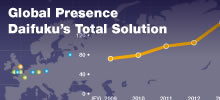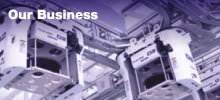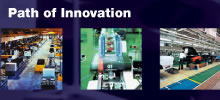Message from the CEO

We received the highest level of orders in our history during the first year of our four-year business plan. Our aim is to continue evolving into a Value Innovator.
Fiscal 2013, the year ended March 31, 2014, was a year of major accomplishments. We expanded both new orders and sales and raised profitability through internal structural improvements. Just as important, we launched robust initiatives to pave the way for future growth. As a result, we exceeded our targets and reported major, double-digit gains in key consolidated performance indicators. Orders rose 31.2% from the previous year, to 276.8 billion yen; net sales increased 19.5%, to 241.8 billion yen; operating income was up a solid 56.8%, to 12.5 billion yen; and net income climbed 74.4%, to 7.7 billion yen. Most noteworthy was that orders reached a record level in Daifuku’s history, and net sales rose close to the previous peak of 242.1 billion yen recorded in fiscal 2008.
During fiscal 2013, we also made progress toward our objective of evolving from a manufacturer of material handling systems into a Value Innovator. We launched our four-year business plan Value Innovation 2017 that will cover the period through fiscal 2016, the year ending March 31, 2017, with targets for the final year of 280 billion yen in net sales and an operating income to sales ratio of 7%. Our performance in fiscal 2013 put us well on the way to reaching these targets.
There were a number of factors that made this performance possible. Foremost among these was economic recovery in North America and Japan as well as expansion in the middle-income classes in the rest of Asia. These factors resulted in excellent performance in our three core businesses. Other important factors contributing to profitability were our efforts in cost-cutting at factories as well as exacting and comprehensive project management at installation sites. Turning to new orders, the ratio of orders from outside Japan in systems for manufacturers and distributors, which had been about 20%, moved up about 10 points to above 30%. This was mainly due to successful acquisitions in North America and the fact that Daifuku systems met local needs in Asia. By industrial sector, orders from the automotive, electronics, commerce, and retailing sectors increased. In particular, the e-commerce sector has also been strong, and we believe that our product development efforts will bring even better performance in this sector in the years ahead.
Daifuku, as a Value Innovator, offers its customers the best solutions to meet their needs, capitalizing on its expertise and technologies it has accumulated for years as a comprehensive manufacturer and integrator of material handling systems. Over the past year, we held 75 meetings at Daifuku Group companies around the world to discuss the four-year business plan as well as what becoming a Value Innovator—which is the centerpiece of our brand strategy—really means.
Major Policies and Results in Fiscal 2013
The key to driving our growth to meet the targets of the four-year business plan Value Innovation 2017 is to strengthen our manufacturing and distribution systems business globally. As a strategic step toward raising the profile of our activities in the North American market, where our presence had been relatively low, we acquired U.S. company Wynright Corporation in October 2013. With Wynright’s sales channels and product lineup, which complement our own, we aim to increase our sales volume and presence in North America.
As another strategic step aimed at future growth in East Asia, we expanded our factories in China and South Korea. In fiscal 2013 in China, orders mainly from the food, beverage, paper, and distribution sectors significantly increased over the previous fiscal year. Meanwhile, as their role as our Group’s global components supplier increased, our factories in China produce and provide components for automobile production line systems not only in China but also to other countries. Also, they manufacture and supply members for airport baggage handling systems to Europe. Another important development in China was the start-up in March 2013 of full-scale operations at our plant in Suzhou, which provides systems to manufacturers of flat-panel displays (FPDs) and semiconductors in collaboration with our subsidiaries in South Korea and Taiwan. Daifuku has, therefore, become the only company in the world’s material handling systems industry to create a strong production framework encompassing China, South Korea, Taiwan, and Japan. Further, to meet the needs of individual markets around the world, we are actively hiring and drawing on the capabilities of affiliate staff who share the same cultural background as our customers. Similarly, we are proceeding with human resource development initiatives and working toward delegating more management responsibilities to our subsidiaries with the aim for expanding businesses.
Responding to New Management Issues
Aiming for a 7% ratio of operating income based on Daifuku’s unique technologies

Our four-year business plan Value Innovation 2017 sets four key management themes: business domains, profitability, brand power, and operational efficiency. Specifically, during the first two years under the business plan, we will work to improve profitability. During the final two years, the plan calls for contributions to performance from new products and new technologies. We should note, however, that in fiscal 2013, the volume of orders received was already close to the goal for the final year of the plan. Not only that, but the ratio of operating income stood at 5.2%, which represented a major step toward our final goal of 7%. To make sure we hit the plan’s targets, we are implementing the following measures.
Introduce a regional supervisory framework
As our activities become more global in scope, from fiscal 2014, the year ending March 31, 2015, three of Daifuku’s representative directors, including myself, will each take overall responsibility for one of three principal regions: North America, Europe, and Asia. We expect this new management arrangement to give us a cross-regional perspective that will increase the overall strength of the Daifuku Group and enable us to market, develop, and manufacture products and systems that best meet the requirements of regional customers.
The North American market is particularly important because of its contribution to current performance and its role in driving growth under the business plan. I will be responsible for North America and will take the initiative in seeking benefits from the collaboration with Wynright and other companies we have acquired in North America as quickly as possible and in raising profitability.
Identify new products and technologies based on cutting-edge technologies
To take the next major leap forward in growth, it is more vital than ever to go beyond applications and extensions of existing technologies and proceed with the development and application of cutting-edge technologies in various fields where future growth is expected. Objectives under the four-year business plan Value Innovation 2017 include creating unique, “one of a kind” products and systems through developing new technologies and M&A and evolving toward highly profitable business operations at not only the plant, but also device and component levels.
In 1993, we developed an electrified monorail system that applied the world’s first non-contact power supply technology. Since then, Daifuku’s wireless power supply systems have been used by many sectors, including automobiles, semiconductors and FPDs, pharmaceuticals, food products, and food containers. We also offer many related solutions, including wireless battery charging systems and cable-less operations. We are also developing device-type products that incorporate these technologies.
As part of a project under Japan’s Ministry of Economy, Trade and Industry and the New Energy and Industrial Technology Development Organization, we developed the Area Management System, and, in February 2014, we became the first company in the world to obtain ISO 13482 certification for personal care robots. Based on ultra-wideband wireless technology, the system enables safer operation by determining the position of vehicles, forklifts, and workers in real time and thereby controlling the speed of vehicles. With this “one of a kind” technology that can determine the position of objects, we are striving to develop products for new markets, such as for preventing the loss of pallets for wholesale markets.
Among other accomplishments, Daifuku developed an automated system for freezer lockers that can operate at –35°C (–31°F) and applied it to develop the world’s first warehouse for fast freezing fish products. In this system, each container has its own RFID tag, and the system won a special award for the 2013 Automatic ID System Grand Prix.
In the area of logistics, along with the increase in the delivery of individual items to the recipients’ homes, technology for minimizing human sorting error has become increasingly necessary. This is a field we have focused on in recent years, and we are working to increase our market share by developing and applying “one of a kind” value-added technologies.
By taking this multifaceted approach, we are working to significantly accelerate technological innovation that will lead to Daifuku’s growth in the years ahead.
Maintain high standards for safety
Daifuku numbers many of the world’s leading corporations among its valued customers. We have confronted challenges head-on, such as quality, on-time delivery and cost from these world-leading corporations, which made us a stronger company. In this respect, safety is no exception. We at Daifuku have been taught well by Japanese automakers whose culture demands starting up operations on-time without accident or incident. Putting safety first at all times protects human life and also prevents delays in delivery and economic losses. We believe this is what has given the Daifuku brand the trust it enjoys today. It is essential for us to transmit this culture of safety that we have nurtured so that others will better understand the importance of safety. We truly believe there should be no limits imposed on the pursuit of safety.
Capital Policy and Return to Shareholders
We issued zero-coupon convertible bonds maturing in 2017, with rights to purchase new shares in the amount of 15.0 billion yen, to strengthen our financial position and increase our shareholders’ equity to achieve the target in our four-year business plan. The funds raised were used for the acquisition of Wynright, capital investment in Japan, and the repayment of borrowings.
 To provide returns to our shareholders, we aim to maximize Daifuku’s corporate value by continuing to expand earnings as we maintain sustainable growth in per share cash dividends, aiming for a dividend payout ratio of 30% of consolidated net income in the medium-to-long term. For the year ended March 31, 2014, we increased dividends for the year by 3 yen per share, to 18 yen per share. This represents a dividend payout ratio of 25.7%. For the fiscal year ending March 31, 2015, we are planning to increase dividends by 2 yen per share, to bring the annual dividend to 20 yen per share.
To provide returns to our shareholders, we aim to maximize Daifuku’s corporate value by continuing to expand earnings as we maintain sustainable growth in per share cash dividends, aiming for a dividend payout ratio of 30% of consolidated net income in the medium-to-long term. For the year ended March 31, 2014, we increased dividends for the year by 3 yen per share, to 18 yen per share. This represents a dividend payout ratio of 25.7%. For the fiscal year ending March 31, 2015, we are planning to increase dividends by 2 yen per share, to bring the annual dividend to 20 yen per share.
We wish to thank you, our shareholders, for your investment in Daifuku and look forward to your continuing support as we endeavor to further increase our return to shareholders.
Masaki Hojo
President and CEO
Daifuku Co., Ltd.











